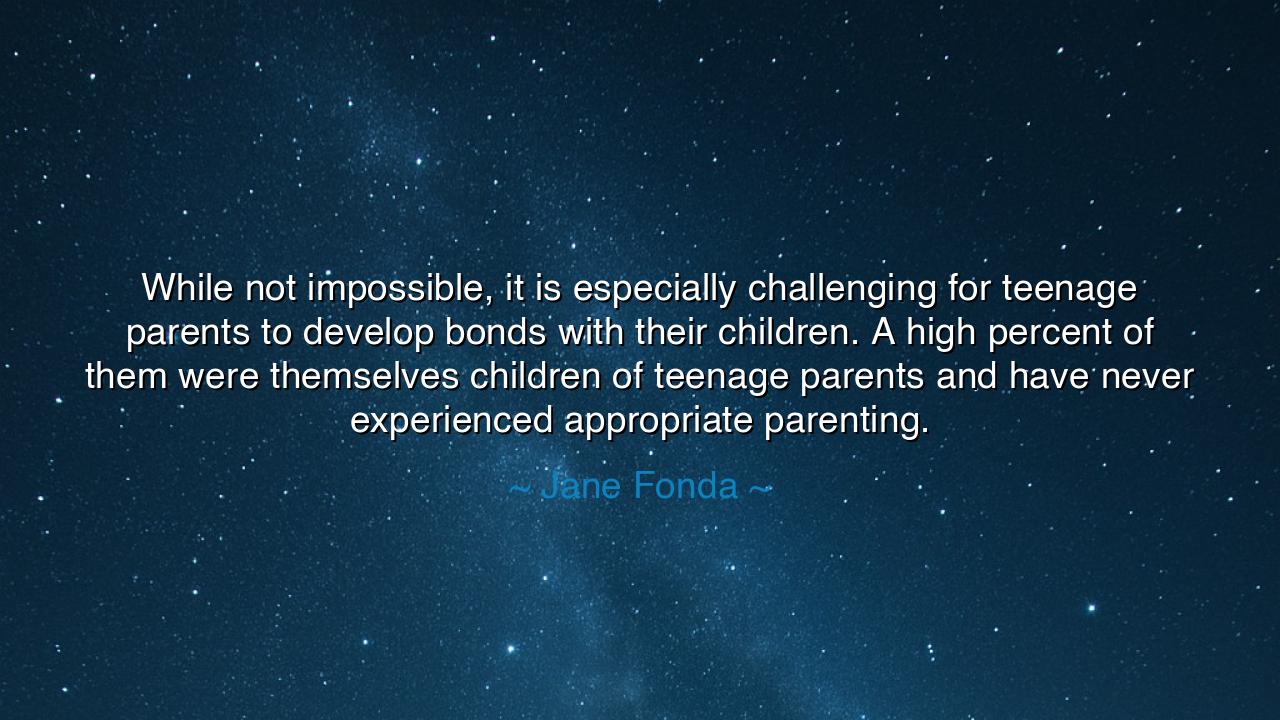
While not impossible, it is especially challenging for teenage
While not impossible, it is especially challenging for teenage parents to develop bonds with their children. A high percent of them were themselves children of teenage parents and have never experienced appropriate parenting.






Hearken, O seekers of wisdom, to the profound words of Jane Fonda, who casts her gaze upon the hidden struggles of teenage parenting. She observes that while the task of raising a child is not impossible, it is especially challenging for those whose own youth has been fragile and unprepared. Many teenage parents were themselves raised by teenage guardians, who could offer neither the stability nor the guidance essential to the formation of deep bonds. In her reflection lies an ancient truth: the capacity to nurture springs not only from instinct, but from the experience of having been nurtured in turn. Where that foundation is absent, the labor of care must be learned amidst adversity.
The origin of this insight lies in both observation and experience, for throughout the annals of human society, the transmission of wisdom and skill from parent to child has been the lifeblood of civilization. From the matriarchs of ancient tribes to the chroniclers of noble lineages, it has been known that children raised without consistent care and guidance often struggle to embody the same qualities when called upon to parent. Fonda’s reflection modernizes this perennial insight, drawing attention to the cycle of generational vulnerability and the urgent need for intervention and support.
Consider the life of Abraham Lincoln, whose early years were marked by hardship and limited parental guidance. Though he grew into a man of profound empathy and moral strength, the early absence of nurturing required him to cultivate patience, insight, and resilience through hardship rather than instruction. In contrast, teenage parents often face similar deficits in support and preparation, striving to provide guidance to a child while grappling with their own unformed experiences of care and structure.
The emotional resonance of Fonda’s words is piercing. To raise a child is to hold another life in one’s hands, shaping their early experiences, trust, and understanding of the world. Teenage parents, still themselves in the process of development, face a double burden: the challenges of adolescence, with its emotional turbulence and identity formation, combined with the responsibilities of nurturing another soul. It is a crucible that tests patience, endurance, and moral resolve, demanding growth under pressure, and forging resilience through daily struggle.
In practical terms, Fonda’s insight teaches that support, guidance, and mentorship are essential. Teenage parents benefit profoundly from community structures, educational programs, and attentive elders who can model the practices of effective parenting, providing both instruction and emotional scaffolding. Historical examples, from the apprenticeship systems of Renaissance Europe to contemporary mentorship initiatives, reveal that nurturing environments can break cycles of neglect, equipping young parents with the skills and confidence to form strong, loving bonds.
Fonda’s observation also carries a moral dimension: society itself bears responsibility. Where structures are lacking, the youngest parents and their children are vulnerable to the perpetuation of neglect and adversity. The heroic act of community and policy intervention—through education, support networks, and compassionate guidance—can transform the trajectory of both parent and child, illustrating the timeless truth that care is not solely a private endeavor, but a social and moral obligation.
From this understanding arises a practical lesson: recognize that parenting skills are learned and supported, not innate. Teenage parents must be provided with resources, mentorship, and emotional guidance to cultivate the bonds essential for their children’s growth. Communities, families, and policymakers alike bear a sacred duty to intervene where preparation is lacking, ensuring that cycles of vulnerability are broken, and that nurturing becomes accessible to all who embark upon the path of raising life.
Thus, the teaching of Jane Fonda endures: while the challenges of teenage parenting are profound, love, support, and guidance can foster resilience and connection. Let all who bear responsibility for the young—whether as parents, elders, or members of society—approach this sacred labor with vigilance, compassion, and wisdom. In doing so, they illuminate the path for those who begin life with fragile foundations, offering the guidance, presence, and nurturing essential to the flourishing of both parent and child across generations.






AAdministratorAdministrator
Welcome, honored guests. Please leave a comment, we will respond soon